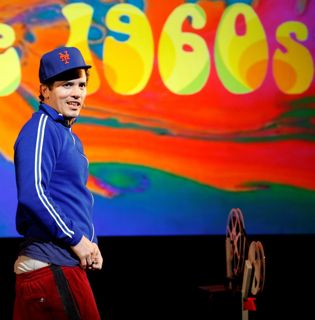
Going to see a one-man show is always a dicey venture, as the details of one’s personal life are bound to hold much more weight for the person who lived them than the one who has to listen to them. While Ghetto Klown, John Leguizamo’s latest one-man show, does not disrupt that trend, Leguiszamo manages to keep it entertaining. Those fond of him and interested in the story of his life will most likely feel he pays the bill for this on-stage therapy session, generously giving energy, humor, and sincerity for his time on the couch.
Giving the Reader’s Digest version of his life from his youth to the present day, back stories on his previous one-man productions included, Leguizamo hits on comic moments and dances his ass off through the musical transitions. Taking a look back at the events that have informed the person he is today, he manages to keep things light even when touching on matters that were emotionally trying at the time they happened. There is something undeniably likeable about Leguizamo that is hard to define. His mischievous smile and sharp eyes reveal an inner youth that is particularly visible when touching on more joyful moments and then crushed as adult realities set in. The piece's most touching moments revolve around Leguizamo’s recollections and impersonations of his Quixote-like grandfather, who dreamed of revolutions while portioning out grandfatherly wisdom. The family resemblance, as seen courtesy of rear-projection, is readily apparently, and Leguizamo summons his grandfather’s spirit with a haunting believability, making him the play's most tangible character after only Leguizamo himself.
The other characters include his parents, girlfriends/wives, friends and a variety of celebrities that he has worked with (my friend Vern does a better Al Pacino), but the focus is aimed at himself. This is less of a one-man show where the actor tries to showcase multiple characters and more of one where he attempts to strip his soul down to the bone and emerge on the other side of analysis fully realized. Upon arriving on the other side it appears that Leguizamo certainly holds more cred’ for the "Klown," as the "Ghetto" only accounts for a small fraction of his story, if you consider Queens to be in possession of such ghettos (those from South Central Los Angeles may not recognize). Over-emphasis on the daring of what prove to be rather banal ad-libs in his film work show the difference between what would be significant to the individual and not nearly as much to others, yet watching Leguizamo is enjoyable. What he’s searching for in life is unclear, even at the play’s conclusion, yet conducting his search in a public manner, on stage, appears to be essential to the equation.
This all ends up being an entertaining night of flipping through someone else’s photo album and sifting through his memories, filled some very funny moments and a few touching ones, but anyone taking any central message or theme from the piece deeper than the importance of resolving your issues, certainly took something away that was lost on this audience member. Taken at face value, Ghetto Klown is entertaining and doesn’t make any promises that it can’t fulfill.
Photo: Carol Rosegg
